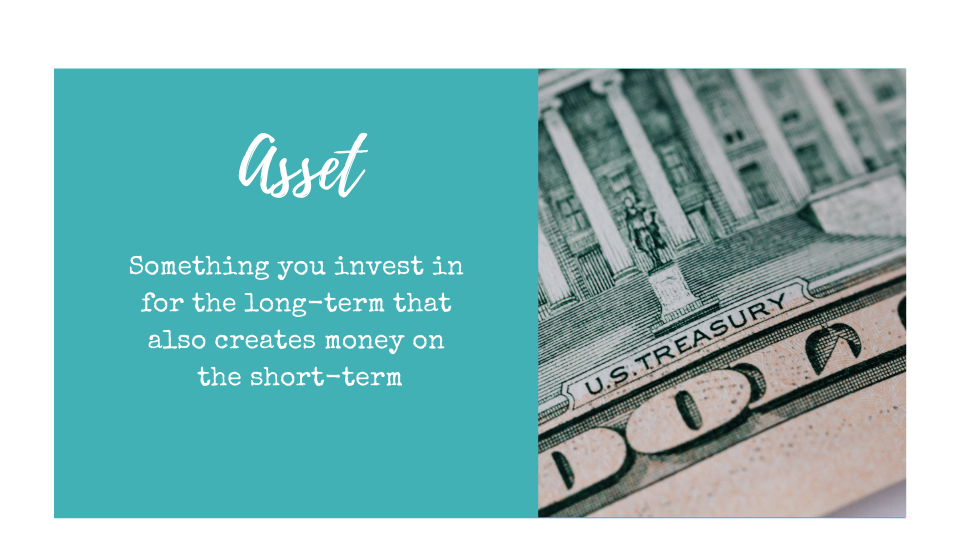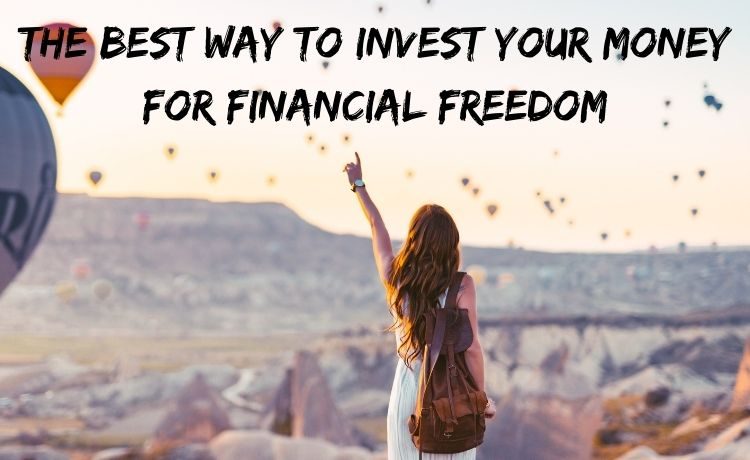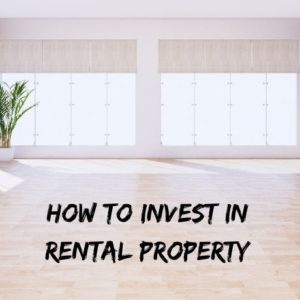An important part of obtaining financial freedom is investing the money you earn. Investing your money is essential in creating a passive income for yourself that will last you a lifetime. To understand your financial future, it’s important to understand the best way to invest your money for financial freedom.
Investing is a container concept and not all ways of investing money are smart when it comes to achieving financial freedom. That’s why we differentiate between ‘standard’ investing and investing+. The last one is the best way to invest your money for financial freedom. In this blog article, we will discuss what investing+ is and show you how you can use this way to invest to achieve financial freedom that will last.
What is investing?
The standard idea of investing is that you use money to buy (financial) products to create a profit on that product after you sell it again. The time between the purchase and the sale is used for the investment to grow. If the product increase in value, you will make a profit and thereby a return on your investment.
Why you always should invest your money
Simply put, if you don’t invest your saved money, you will be guaranteed that your money disappears over time. There are a few important reasons for this:
- Taxes: governments not only tax income but also wealth. The rules and percentages vary per country, but almost all countries have this tax regime that will cut your money by a percentage each year
- Negative interest: if you have a large amount of money in the bank, the bank will charge you interest and fees. Often, the higher the amount in the bank, the higher the costs.
- Inflation: over time, the cost of everything you buy will go up, resulting in lower purchasing power of your money over time. In simple terms: 4 dollars will buy you a beer now, but in 10 years that beer will cost you at least 6 dollars.
Taxes on wealth vary per country, but in general, you can assume at least 1% (in the Netherlands there is a complex system with several thresholds). Currently, in the Netherlands, you have to pay interest if you have a certain amount of money in the bank. On average this is 0,5% when you have more than 250,000. In addition, the average inflation numbers are around 2%.
If we take for example the situation that you would have saved 500,000 euros, you can calculate the speed of the depreciation of your hard-earned money. With a total depreciation due to wealth tax, negative interest, and inflation, your 500,000 euros in savings will only be 350,000 euros after 10 years. That’s 150,000 euros gone!
So, it might be clear that you need to invest your money into something that avoids taxes, interest, and inflation. Something that – at the minimum – holds its value over time so that your 500,000 will remain 500,000 euros. However, the best thing would be to make your money grow. And investing has that ability.
When it comes to financial freedom, there is however an extra very important reason why you want to invest your money.
By investing you can create a direct passive income from your investment. This is essential because if you invest smart, you will not only be able to keep your money to hold its value, but you can generate a return in the long term while also getting a monthly salary in the short term. This combination is how you will be able to live your life the way you want to.
Learn more about how we created a solid passive income and were able to retire before our 40th by reading the blog article Retire before you’re 40.
The best way to invest your money
Investing your money in the standard approach is about making extra money. It’s about getting that profit (or return) from your investment.
However, this standard way of investing will not provide you with a guaranteed monthly income stream. And this is exactly where in our approach we make a distinction between an investment and an asset.
While an investment is focused on the long-term, with the goal of making a profit in the future, an asset is something you invest in for the future that also creates a short-term income.
A good asset is actually an investment+ which can provide you with a passive income, giving you financial freedom (without an expiration date). As long as you keep your money invested in the asset, the asset can generate money for you.

The difference between an investment and an asset
Let’s illustrate the difference between an investment and an asset with an example. Let’s say you want to invest your money in real estate. You find the perfect apartment for a good price and you are pretty confident that if you sell in a few years, the real estate will make a good return for you once you sell it again. That is a standard investment.
Now let’s take the same apartment, but instead of only buying it and selling it after a few years, you also decide to rent it out while you have ownership of it. Now you still will make the profit after you sell it, but in addition, you also created an extra monthly revenue stream from that investment.
You created an asset, which is an investment+. This asset now generates extra money for you on top of the profit you get after selling the investment. You can use this extra income to save more money to invest in other assets or you can use this money to replace (part of) your work income. When you do this, you are setting yourself up for financial freedom.
Types of assets for financial freedom
Hopefully, you have a clearer view of the difference between standard investing and investments+. While a standard investment gives you a possible future profit once you sell it, a good asset will do that as well while also giving you a direct monthly (passive) income.
In our approach, we focus on creating assets instead of purely investing money. We only invest if we can also turn that investment into an income generator in the short term. This is the secret of financial freedom in the long term!
Let’s imagine again that you have 200.000 euros in the bank. You now have three options:
- Leave the money in your bank account and live from it, but then the money will be gone in a few years and you will have to start over again
- You could also invest the money in the stock market or in cryptocurrencies. This way, if the stock market goes up, you make a profit. The stocks might grow your wealth over time, but it is not a guarantee that this will happen and it doesn’t generate a steady income stream every month. We call this an investment.
- A third option is to invest the money in something that might increase in value over time but also gives you also a direct income stream. This could for instance be investing in a property that you rent out every month. This is an asset.
Standard investments are great for creating extra cash flow. And they might make you a lot of money. But creating and investing in assets is the only way to go if you are looking for steady financial freedom in the long term.
Are stocks a good investment for financial freedom?
At the moment, investing in stocks is enormously popular. There are even a lot of people that try to achieve financial freedom by investing in stocks, bonds, or ETFs (Exchange Traded Funds).
It makes sense to invest in stocks because the money isn’t getting any interest in your bank account. Another benefit of investing in these products is that you don’t need a big amount of money. You can start investing right away. Because of this, investing in stocks, bonds or ETF’s can be a great way to get some extra money flowing in.
However, investing in stocks is standard investing: you are buying with the gamble on future profits. Stocks aren’t assets and you shouldn’t consider them as such.
Stocks will not provide you with a passive income without selling
Unless you are day trading and making crazy decisions, the return on investment from stocks is around 6% on average. This isn’t bad at all and you could definitely grow your savings like that. But, to create financial freedom, we don’t only want a profit when we sell, we want a direct monthly passive income from our investment. This marks the difference between a standard investment and investing in an asset. The monthly income from your asset will replace our monthly job income, which will allow us to spend our time in freedom the way we like it.
And exactly this is difficult with stocks. There are stocks that pay a dividend, but generally, this is only around 1-2%. With such a percentage you would need 1,2 million euros in stocks to have a passive income of 1,500 euros per month. And then you still will have to take into account the wealth tax you will have to pay, which is also around 1-2%. Compare this to investing the same amount of money in for instance rental real estate properties and you can see how much more revenue the real estate will give you compared to the stocks.
Achieving financial freedom by investing in stocks or ETF’s alone isn’t impossible, but it definitely is a more risky and less profitable way than investing in assets.
But wait, isn’t investing your money risky?
Of course, there are risks involved with investing. One important risk is that your investment doesn’t increase in value over time, but it decreases. Or something could happen to your investment. For instance, if you invest in a rental property, there could be a fire or another damage to the property. It would take extra money to repair the problem and this would be negative for your possible return on investment.
So, yes there is a possibility that your investment will cost you money. Investing always comes with a certain level of ‘gamble’ on future profits. Nobody can foresee what will happen in the future and therefore there is always uncertainty and risk involved.
However, as you have seen in the calculation example we used, the downside of not investing is very clear. And that depreciation is a given: your money will evaporate over time. The good thing about investing is that you can influence the level of risk by choosing your investments wisely. Your choices determine the level of risk you are willing to take and that influence over your own finances is an important benefit.
What about financing your investments with a loan?
Well, there are a lot of things to say about this, and we understand that it might be tempting, but in general, we wouldn’t advise you to finance your investment with a loan.
In investing for financial freedom, it is preferable that you invest with your own money. That way you don’t risk problems with the bank if your investment should devaluate over time (which of course, hopefully, won’t happen). Banks may force you to sell your investment to be able to pay for the interest that you owe them.
In addition, a loan costs money. There is the interest that has to be paid, but there are also service fees and closing costs. All these costs directly have to be paid from your return on investment. Another downside of a loan is that there are often a lot of rules involved. Rules on how to repay the loan and how long you have to pay interest. You even might face loan repayment penalties when you want to stop the loan.
The best way to invest your money
So, to conclude this blog post, we would like to point out the best way to invest your money for financial freedom in the long term:
- Always invest your money, your money will disappear over time if you don’t
- Use investing+, instead of ‘standard’ investing, invest in assets that generate a possible future profit once you sell it ánd a direct monthly passive income
- You can use ‘standard’ investing to grow your savings and create an extra income stream. This will help you to go for investing+ (in assets) sooner
- Invest with your own money if possible, don’t use a loan to invest as this is a more risky and costly strategy in the long term
- Determine the passive income you need from your assets
- Don’t think yourself rich. Be honest and take all the costs into account (including wealth tax) to know the amount of passive income you will have left





